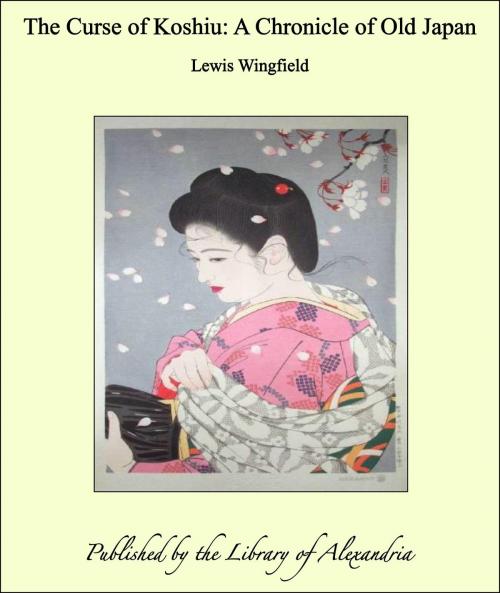The Curse of Koshiu: A Chronicle of Old Japan
Nonfiction, Religion & Spirituality, New Age, History, Fiction & Literature| Author: | Lewis Wingfield | ISBN: | 9781465554086 |
| Publisher: | Library of Alexandria | Publication: | March 8, 2015 |
| Imprint: | Language: | English |
| Author: | Lewis Wingfield |
| ISBN: | 9781465554086 |
| Publisher: | Library of Alexandria |
| Publication: | March 8, 2015 |
| Imprint: | |
| Language: | English |
BOY AND GIRL. It was towards the end of the fourteenth century that the grandeur of the Hojo family rose to its acme, then fell with awful crash. The feudal story of the Land of the Rising Sun is a long dark chronicle of blood and tears, of crime and rapine, of vengeance and vendetta, out of which there glints at intervals a gleam of glorious heroism, of holy devotion, of pure love and unsullied faith. In the stately roll of the great names of old Japan, there is none so terrible as Hojo. From time to time the patient people were ruled by one race or another of despots, cruel and selfish; the most cruel of all, the Hojos. Even now, after five hundred years of war and havoc, of vain aspirations, power misused, and wrecked ambitions, mothers still hush their babes to silence by breathing the dreaded name. The most destructive insect that ravages the fairest island in the world--the most voracious and omnivorous--is yet known as the Hojo beetle. When the first of the line erected a strong fortress--the Castle of Tsu, which will serve as background to many scenes in this our chronicle--he gave to it a bloody baptism, by burying beneath the foundations two hundred living men. Although their baleful course was marked by an ensanguined streak like a gory finger drawn across a map, they were not all black, these gruesome daimios, or even Buddha, whom we know to be deaf, and prone to somnolence, would earlier in the day have bestirred himself to punish them. Maybe Buddha drinks too much saké, for though we piously crack our finger-joints, and beat our palms, each morn at sunrise, and bang the gongs and pull the bell-strings each evening in the temple, he recks little of mere mundane worries, letting things go from bad to worse in grievous fashion. And yet, once roused to wakefulness, his vengeance is swift as the typhoon, as destructive and as sweeping. No. The lurid Hojo cloud that for a hundred years brooded over long-suffering Japan, had silver breaks in it. The Mikados, as nominal rulers, dwelt at Kiŷoto; while the Shoguns, as military viceroys, reigned at Kamakura; but the dominating family, as wire-pullers, directed their movements from behind. The father of Hojo No-Kami, last of the race, had his good points. None of his supercilious ancestors was more superbly overbearing, more sublimely indifferent to human pain; and yet his worst enemies were compelled to admit that, if stern, his rule was sagacious. The Mikado, and his court of kugés or lords-in-waiting, shivered before him, for his dirk was loose in the scabbard, and the order promptly to depart into another world by uncompromising harakiri was ever trembling on his lips. During his career three emperors had been summoned to shave their heads and retire into monkish solitude, each puppet bowled over in its turn for daring to dispute his will; and yet the very fact of his disdaining to mask the iron hand under the glove of silk, even in dealing with the highest, compelled the unwilling admiration of his turbulent and light-hearted countrymen. The upper class--Samurai, two-sword men, hatamotos, soldiers--could appreciate his martial bearing, as, in gallant bravery of scarlet armour and gold-studded helm, he rode forth to battle, with his martial wife beside him. For the beautiful Tomoyé was a fit mother for lion whelps. Of great personal strength as well as graceful carriage, sheathed in armour like her lord, astride on a swift horse, she was ever in the van of conflict. With her own hand she cut off the head of a rival daimio who crossed swords with her; and when her lord died, pierced through the heart by an arrow she fought till she fell beside him. The lower class of the unarmed--mechanics, mere farmers, paltry merchants--could also from their inferior standpoint admire their ruler, whilst grieving at his rough treatment of the Holy Mikado--mystic head of all--for he protected the workers of the hive from the depredations of other tyrants. The burthen of taxes was nicely weighed to suit the backs of the bearers. The ken of the Hojo was as piercing, and minutely attentive to details, as it was farsighted. A petition from the elders of the meanest village was sure of immediate attention. No petty feudal master, however recklessly bold or savagely contemptuous, dared to overstep his rights
BOY AND GIRL. It was towards the end of the fourteenth century that the grandeur of the Hojo family rose to its acme, then fell with awful crash. The feudal story of the Land of the Rising Sun is a long dark chronicle of blood and tears, of crime and rapine, of vengeance and vendetta, out of which there glints at intervals a gleam of glorious heroism, of holy devotion, of pure love and unsullied faith. In the stately roll of the great names of old Japan, there is none so terrible as Hojo. From time to time the patient people were ruled by one race or another of despots, cruel and selfish; the most cruel of all, the Hojos. Even now, after five hundred years of war and havoc, of vain aspirations, power misused, and wrecked ambitions, mothers still hush their babes to silence by breathing the dreaded name. The most destructive insect that ravages the fairest island in the world--the most voracious and omnivorous--is yet known as the Hojo beetle. When the first of the line erected a strong fortress--the Castle of Tsu, which will serve as background to many scenes in this our chronicle--he gave to it a bloody baptism, by burying beneath the foundations two hundred living men. Although their baleful course was marked by an ensanguined streak like a gory finger drawn across a map, they were not all black, these gruesome daimios, or even Buddha, whom we know to be deaf, and prone to somnolence, would earlier in the day have bestirred himself to punish them. Maybe Buddha drinks too much saké, for though we piously crack our finger-joints, and beat our palms, each morn at sunrise, and bang the gongs and pull the bell-strings each evening in the temple, he recks little of mere mundane worries, letting things go from bad to worse in grievous fashion. And yet, once roused to wakefulness, his vengeance is swift as the typhoon, as destructive and as sweeping. No. The lurid Hojo cloud that for a hundred years brooded over long-suffering Japan, had silver breaks in it. The Mikados, as nominal rulers, dwelt at Kiŷoto; while the Shoguns, as military viceroys, reigned at Kamakura; but the dominating family, as wire-pullers, directed their movements from behind. The father of Hojo No-Kami, last of the race, had his good points. None of his supercilious ancestors was more superbly overbearing, more sublimely indifferent to human pain; and yet his worst enemies were compelled to admit that, if stern, his rule was sagacious. The Mikado, and his court of kugés or lords-in-waiting, shivered before him, for his dirk was loose in the scabbard, and the order promptly to depart into another world by uncompromising harakiri was ever trembling on his lips. During his career three emperors had been summoned to shave their heads and retire into monkish solitude, each puppet bowled over in its turn for daring to dispute his will; and yet the very fact of his disdaining to mask the iron hand under the glove of silk, even in dealing with the highest, compelled the unwilling admiration of his turbulent and light-hearted countrymen. The upper class--Samurai, two-sword men, hatamotos, soldiers--could appreciate his martial bearing, as, in gallant bravery of scarlet armour and gold-studded helm, he rode forth to battle, with his martial wife beside him. For the beautiful Tomoyé was a fit mother for lion whelps. Of great personal strength as well as graceful carriage, sheathed in armour like her lord, astride on a swift horse, she was ever in the van of conflict. With her own hand she cut off the head of a rival daimio who crossed swords with her; and when her lord died, pierced through the heart by an arrow she fought till she fell beside him. The lower class of the unarmed--mechanics, mere farmers, paltry merchants--could also from their inferior standpoint admire their ruler, whilst grieving at his rough treatment of the Holy Mikado--mystic head of all--for he protected the workers of the hive from the depredations of other tyrants. The burthen of taxes was nicely weighed to suit the backs of the bearers. The ken of the Hojo was as piercing, and minutely attentive to details, as it was farsighted. A petition from the elders of the meanest village was sure of immediate attention. No petty feudal master, however recklessly bold or savagely contemptuous, dared to overstep his rights















